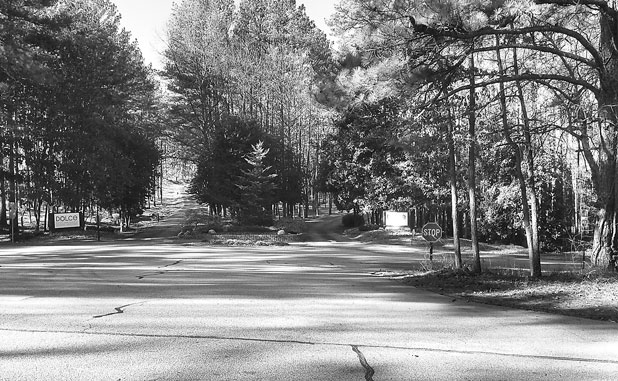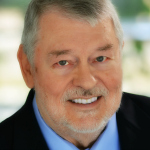So, here we are, in the spring of the 56th year of Peachtree City’s existence as a “new town,” a “planned community,” and Great Wolf is at our door.
One side — and probably a majority of the tax-driven City Council — argues that the proposed indoor water park tourist resort is just too good to turn away.
To this group, the change from the sleepy — and money-losing — Dolce conference center to a job-producing and city-revenue-increasing tourist attraction is worth welcoming, despite one of the strongest anti-rezoning outcries from opponents in many years.
To those who oppose granting Great Wolf Lodges of Ga., nearly everything the company asked for — including a significant incursion into a buffer zone that protects an adjacent area of homeowners and renters — the council rezoning and variance grant represents an invasion of residents’ privacy and “quiet enjoyment,” a legal term that attorneys specializing in landlord-tenant law will recognize. This invasion also will cause homes and entire neighborhoods to drop in resale value, these opponents believe.
Here are some arguments for and against giving Great Wolf what it wants. (Full disclosure: My wife and I live in The Coventry subdivision, which is adjacent to the eastern side of the current Dolce property. My backyard is about a half mile from the proposed water park. On occasion, from my deck, I can hear the Dolce’s heavy machinery running day or night.)
FOR
• The lodge, water park and more than a dozen related retail businesses on the site will likely revitalize that already-commercially zoned 38 acres with both new and refurbished facilities and a compelling need to succeed after an infusion estimated well above $70 million to be spent before the resort can take in its first tourist dollar (“$40 million on construction, $32 million on personal property including amusements and $4 million on soft costs related to construction activity,” according to The Citizen story April 1).
After it opens, a Georgia Tech study estimates upwards of a half-million “visitor nights … at full operation,” resulting at some point in the future of an “economic impact of … more than $75 million and … 400 new jobs in Peachtree City and nearly 770 jobs across the economy resulting in more than $20 million in local personal income.”
That’s a lot of loot from one 38-acre, under-producing commercial parcel, if the hastily produced study is to be believed and trusted. More on believability below.
• Great Wolf represents a dramatic and highly visible turnaround for the business fortunes of Peachtree City. No big box here; it’s something new: an attraction to our city that may convince outsiders that PTC is a happening place, not a graying, declining Big Idea gone stale. After Fayetteville stole the development limelight with a big-time movie studio, this would be PTC’s call bet on the big-stakes poker table.
• The alternatives could be bleak, advocates warn. If Great Wolf slinks back to its northern den, defeated and cursing whoever sold them on the notion of a tourist attraction next to residential neighborhoods deep inside the heart of a carefully planned and rigorously zoned village, then what comes next could be even worse, supporters assert.
Great Wolf advocates — including those on City Council — warn of dire consequences of letting nature take its course on the failing conference center. Some paint a lurid picture of pawn shops, tanning parlors and fast food drive-thru lanes replacing the good neighbor Dolce on the already-zoned commercial site.
The direst of all is the hushed threat of an abandoned, empty hotel, peopled only by up-to-no-good teenagers and street people seeking pretty good free shelter.
“How do you like Great Wolf now?” some advocates will taunt Preston Chase homeowners.
• More mundane, but greatly pressing is the city government’s need for more money, some of it to pay for those city worker pay raises granted by a 3-2 vote last year, although the money wasn’t planned in this year’s budget and has no funding source other than the city’s rainy day reserve “savings account.”
(As an aside, see if those who voted for the pay raise will also be the ones who vote in favor of Great Wolf. That’s called “following the money.” For the pay raise: Fleisch, King and Ernst. Against the pay raise: Imker and Learnard.)
City property taxes likely will rise if Great Wolf falls, advocates promise.
• The philosophical principle — A property owner ought to be able to do with his/her/its property what it wants to. That’s what capitalism, free markets and the libertarian notion of freedom are all about. Great Wolf wants a water park; it’s their property; they should have the right to turn their property into a water park.
AGAINST
It’s likely most residents of Peachtree City have no strong feelings one way or the other about a water park floating onto Aberdeen Parkway. It’s also likely that a small number of folks really want the water park, and its location is mostly no big deal to them, mainly because it truly will not be “not in (their) back yards.”
But for a significant number of core opponents, Great Wolf’s intrusion into their lives and property values is a (metaphorical) call to arms about a principle that founded America: “Don’t threaten my home or my family!”
This group identifies with that historic cry, “The British are coming!” And members of this energized group of city voters will be rallying within shouting distance of City Hall Thursday afternoon prior to marching via foot and golf cart to the City Council meeting chambers for the 7 p.m. meeting.
So far as I can remember or discover, in my 38 years of living in this “planned community,” there has never been a comparable protest march on City Hall.
Why? Why are these folks so negative toward Great Wolf on the Dolce site?
• It’s not Great Wolf. It’s where Great Wolf wants to live. GWL wants everyone to believe that a serious tourist destination will have little additional adverse impact on its neighbors, compared to the 30 years of low impact, mostly bussed-in business travelers who came and went from the Pitney-Bowes training center that became the Aberdeen Woods Conference Center that became the Dolce with hardly a local ripple.
If you’ve got to have a commercially-zoned neighbor in your backyard, you would want it to be PB-AWCC-D. Some problems have occurred (mainly water drainage), but the occupants of that site have been unobtrusive — and thus, good — neighbors.
On the other hand, let’s discuss believability of the optimistic claims made for the new water park.
The “no big deal” spin put on the change from a conference center to a tourist attraction — starting with the city planner’s recommended approval of the rezoning and variances requested and continuing with some local heavy hitters patronizing nearby residents with bogus offers to buy their homes should their property values be damaged — has been insulting to the opponents and a cause for shame for the ardent GWL evangelists.
The so-called traffic study looks like a hack job, a thinly disguised joke. For a professional traffic study to assert that a tourist destination with more than a dozen new retail attractions and a hotel boasting of a half million new visitor nights per year would have “no appreciable impact” on current traffic on Ga. Highway 74 and Aberdeen Parkway almost defrauds the taxpayers who paid that study invoice.
• Jobs and a boost to local economy: The jobs will be low-pay, even minimum-wage positions, many of them part-time. Most of the folks who will depend on wages derived from GWL will live elsewhere and will have to commute, further increasing traffic problems. These are not career jobs; these are seasonal slots whose numbers rise and fall with hotel occupancy, which GWL officials admit rarely rises above 60 percent and often times is much lower. There may be jobs, but there will be a lot of layoffs as well, depending on the tourist traffic.
• Property values: Nobody really knows. Advocates for GWL cannot produce any evidence of impacts — negative or positive — on property values of nearby residential areas. Why? Because they’ve never built so close to such an existing area before. In one location, a group of homes lies across a heavily-traveled multi-laned highway from a water park. There are no comparable situations to the Aberdeen site.
The converse is mostly intuitive: Would I want to buy a home next to a water park, especially if I would be forced to rent a resort hotel room for the night if I wanted to enjoy the water park facilities? I’d be afraid I’d get all the negatives immediately — the noise, the lights, the heavy chlorine odor, the water runoff, the traffic — with no immediate or even medium-term benefits.
And if I can’t enjoy the benefits of the water park, why would I want to live next to one?
That’s a pertinent property value question.
• The whole idea of a tourist destination plunked down on the city’s signature wooded parkway, right in the midst of residential neighborhoods, runs contrary to the longstanding notion of Peachtree City as a village-centered city with defined village commercial cores and well-defined and well-protected (by zoning restrictions) residential areas.
This GWL proposal is not planning. This is money talking – and splashing.
The good of the many is subjugated to the commercial desires of one nonresident entity. If GWL gets what it wants, a city government originally formed to promulgate the practical vision of a planned city will have abdicated its responsibility to protect its voting and tax-paying residents from a naked violation of that principle. The city government, by saying yes to Great Wolf, will be colluding with this intentional degradation of the Peachtree City vision.
And this new principle would be established: Zoning buffers to protect homeowners from encroaching commercial developments are untouchable — unless such a buffer interferes with a city council majority’s need for more money.
At that critical money-waving point, the council would ask the next Wolf neither how high nor how deep, but rather, identify whatever stands in your way, Mr. Wolf, so that we may remove the obstacles. Don’t pay any attention to those home-owning, tax-paying voters. They elected us; this is what they get.
************
So, situationally biased as I am, where do I come down on this matter of a water park and a likely revenue-seeking council majority versus an engaged, vocal and voting group of homeowners who think the city is overruling their concerns and telling them to take one for the team?
I’m reminded of that old joke. A very rich man asks a beautiful woman he just met, “Would you sleep with me for one hundred million dollars (inflation)?” The woman replies, “Well, yes, I think I might.”
The man then says, “What if I offered you one hundred dollars? Would you sleep with me then?” The woman slaps him and says, “What kind of woman do you think I am?”
The man replies, “We’ve already established that. Now we’re just negotiating the price.”
In the best possible outcome, after the council prudently turns down the egregious variance request, and GWL has to either leave town or take the site as it’s currently zoned, it’s time to negotiate. After all, what kind of council majority do we think they are?
[Cal Beverly has been editor and publisher of The Citizen since its founding in 1993.]










Leave a Comment
You must be logged in to post a comment.